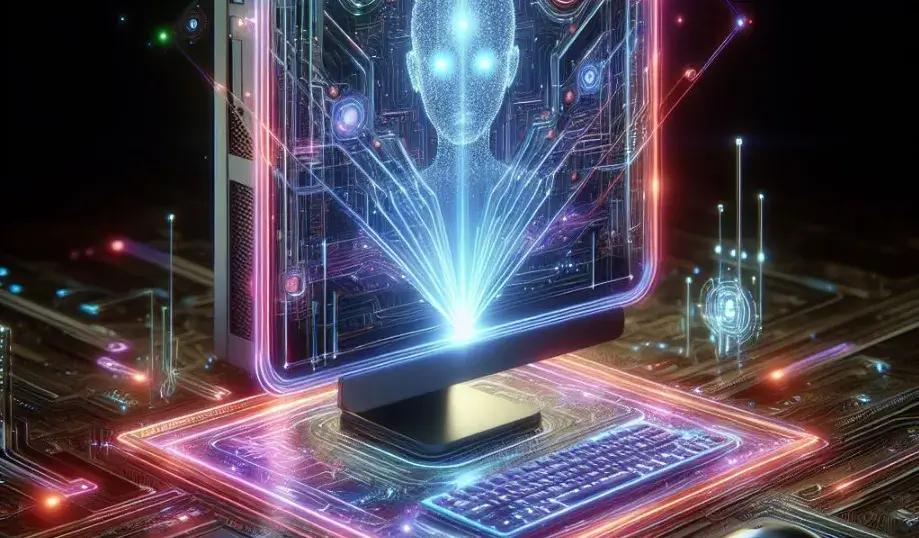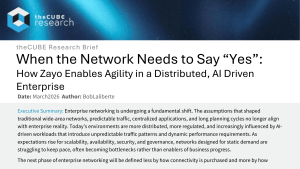Abstract: The AI PC will be the next evolution in personal computing, offering unprecedented levels of productivity, connectivity, and intelligence. Companies that succeed in this new era will be those that invest in custom silicon, develop strategic partnerships, and create AI-driven devices that cater to a wide range of users. The future of personal computing is here, and it is AI-powered.

PC for the new GenAI era
“Is the PC Dead? Long Live the PC” was a headline written last week, and this idea is quickly gaining traction. It marks the beginning of a rapid evolution toward AI-driven agents and serves as a key driver for the accelerated development of custom silicon.
Video Commentary. Is the PC Dead? No way it's the next big thing. Here is my narrative on theCUBE Podcast 2 weeks ago with my cohost of the pod Dave Vellante.
— John Furrier (@furrier) September 15, 2024
Notes: The Emergence of AI PCs and the Transformation of Personal Computing. The AI PC will be the next evolution… pic.twitter.com/7aUZTbHPqy
The personal computer is entering an era of radical transformation, where artificial intelligence (AI) is poised to redefine what computing means at the most fundamental level. This transition is more than just incremental—it represents a complete overhaul of personal computing devices, architecture, and the user experience. AI PCs, a category I believe will dominate the future, will fundamentally alter how we interact with technology, both at home and in the enterprise.
The Death and Rebirth of the Personal Computer
The phrase “The personal computer is dead, long live the personal computer” encapsulates this transformation. While traditional PCs might seem stagnant, they are on the verge of a renaissance driven by AI, augmented reality (AR), virtual reality (VR), and custom silicon advancements. Companies that successfully integrate AI into the core of their computing products will emerge as leaders in this new era. Those that fail to pivot risk extinction.
Dell, Lenovo, and HP, despite struggling with market downturns in recent years, now have a rare opportunity to thrive. Their deep-rooted supply chains, extensive distribution channels, and comfort in operating low-margin businesses will position them well as the AI PC revolution unfolds. The AI-driven future of personal computing will breathe new life into the industry, unlocking significant cash flow for these manufacturers.
Personal Computing in the AI Era
The term “personal computer” may no longer do justice to the devices of tomorrow. The future of personal computing will be inherently more personal and productive, driven by AI’s ability to optimize daily tasks. This goes beyond traditional office tasks—personal productivity, powered by generative AI, will be at the heart of this new category. The devices we call “PCs” today will transform into a wide array of connected devices that work seamlessly across personal and professional contexts.
Agentic Systems will play a critical role in this future. These intelligent systems, which perform tasks autonomously, will enhance productivity by allowing users to delegate repetitive or complex tasks to AI-powered agents. This is a major shift from today’s devices, where the user must interact directly with the system at every turn. AI PCs will evolve to handle much of this work independently, leaving users free to focus on higher-order tasks.
Custom Silicon: A Prerequisite for Success
One of the most critical enablers of this transformation is silicon diversity, particularly the rise of custom silicon tailored for AI workloads. Major players like Apple have set the standard with their M-series chips, which integrate AI processing at the silicon level. Qualcomm is another key player, and ARM-based processors are rapidly gaining traction due to their efficiency and adaptability to AI workloads. This trend is poised to reshape the entire personal computing industry.
For manufacturers like Dell, HP, and Lenovo, embracing custom silicon is no longer optional—it’s a survival requirement. Without custom silicon optimized for AI, these companies will find it impossible to compete in the new AI PC landscape. The performance of future devices will be judged primarily by their ability to handle AI workloads, and this requires a total rethinking of how these devices are designed and built.
This is an extinction moment for many companies, similar to the impact of Y2K. Those that embrace AI-driven custom silicon will emerge stronger; those that don’t will fade into obscurity. Custom silicon also opens the door to AI-optimized devices that can seamlessly integrate into the cloud, enabling personal computing devices to harness vast cloud resources for computationally intensive tasks.
The Future of Personal Devices: AI-Driven, Connected, and Multimodal
The personal computing devices of tomorrow will not resemble the laptops or desktops of today. Instead, they will be a network of devices, both large and small, designed to work in harmony. From powerful servers that support enterprise-level AI workloads to smaller, portable devices running on battery power, the new AI PCs will work together in a distributed fashion, creating a seamless user experience.
The rise of multimodal AI applications—such as AR and VR—will further shape the evolution of personal computing. These immersive technologies, powered by AI, will enable entirely new use cases, from personal productivity enhancements to enterprise-level tasks like product design and simulation. This future will blur the lines between personal and professional computing, requiring manufacturers to think more broadly about how their devices will be used.
The Ecosystem and the Role of Partnerships
No single company will dominate this space alone. Success will depend on a broad network of partnerships, particularly with software providers and cloud service platforms. In the past, personal computing relied on an ecosystem of Intel processors, Windows, and independent software vendors. That model is now obsolete. Today, companies need to form alliances with cloud providers like AWS and software innovators driving AI-centric applications.
Software will play a pivotal role in how these devices are judged. If a device cannot seamlessly run AI workloads or connect efficiently with cloud infrastructure, it will fail. The future will be about integration—hardware and software working together to deliver AI-optimized performance. This requires not only next-gen operating systems but also AI-powered applications that are deeply embedded into the hardware.
Supply Chain Resilience and Geopolitical Considerations
Geopolitical risks are a major factor for manufacturers looking to develop AI PCs. The global semiconductor supply chain remains heavily reliant on regions like East Asia, and tensions in those areas pose a real threat to production. Manufacturers must address these vulnerabilities by diversifying their supply chains and investing in domestic chip production.
However, supply chain resilience isn’t just about mitigating risks—it’s about ensuring that manufacturers can keep pace with the fast-evolving demands of AI workloads. Companies that can’t secure a steady supply of cutting-edge chips will find themselves left behind. The focus should not only be on securing supply chains but also on innovation. Manufacturers that invest in custom silicon development, ensuring their devices stand apart, will have a significant advantage.
Redefining User Experience: A Holistic Approach to AI PCs
Beyond performance, the user experience will define the success of future AI PCs. This is an opportunity for manufacturers to focus on human-centered design, making devices that are not only powerful but intuitive and secure. With AI taking on more critical tasks, security and privacy will become essential elements of user trust. Companies that can build robust, secure AI PCs will gain a significant edge in this new market.
The integration of agentic systems into personal computing will be another defining characteristic of the AI PC. These intelligent systems will autonomously perform tasks on behalf of users, enhancing productivity and enabling them to focus on more creative and strategic work. The shift to agentic systems is a major leap forward in how we think about personal computing, and it will fundamentally alter the relationship between users and their devices.
The Road Ahead: Opportunities and Challenges
The AI-driven transformation of personal computing presents both significant opportunities and challenges for manufacturers. Companies like Dell, HP, Lenovo, Apple, and others stand to benefit greatly if they can successfully integrate AI into their devices. Custom silicon, cloud integration, and a focus on AI-specific workloads will be critical success factors.
However, this transition also presents risks. Companies that fail to adapt quickly will be left behind, and the competitive landscape will shift dramatically as AI-centric personal computing becomes the new norm. The winners will be those that invest in the future, reimagine the role of personal computing devices, and build ecosystems that cater to both developers and end-users.
As the lines between personal and professional computing blur, the next generation of devices will be faster, smarter, more connected, and integral to users’ lives in ways we have not yet imagined. This is the future of the personal computer—a future driven by AI.
The next set of questions will be how will AI Agents evolve? What’s next for silicon diversity?
If you appreciate our research, we encourage you to engage with it—share, comment, direct message us, or tell a colleague. You can also become a part of our growing CUBE Collective, a community of expert contributors dedicated to amplifying innovation and fostering collaboration.
At theCUBE Research, we are committed to providing high-quality, free research content on this site to serve our growing community. Over the past 15 years, we’ve worked to elevate the conversation around technology trends and innovation, and we’re honored to be recognized globally for our dedication. Our goal is to stay humble and aligned with our audience and top innovators, fostering trust through insightful, reliable content.
If you want to be part of our community just engage or if you’re an expert and/or and active technology focused content creator then join our growing Cube Collective.
What is theCUBE Collective
TheCUBE Collective is a unique, open community designed to elevate high quality content creators by collaborating with and amplifying their work. At its core, theCUBE Collective applies open-source principles to content creation, enabling creators to share their work freely while leveraging the reach of a global platform.
For creators, the Collective provides unparalleled visibility across theCUBE’s extensive network of tech coverage, interviews, and research publications. It offers an opportunity to showcase high-quality content and gain exposure to an audience that values expert insight and innovation.
For our audience, theCUBE Collective offers free access to valuable content from thought leaders and experts—no paywalls. This curated collection of expert interviews and research ensures professionals stay connected to cutting-edge developments in technology.
In a nutshell, theCUBE Collective is a win-win platform where creators gain recognition and audiences receive high-quality insights, all within a community-driven environment.


